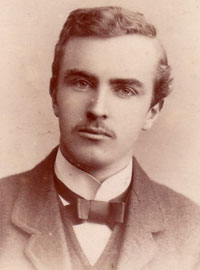22 April 2010 Edition
Remembering the Past: Michael O'Rahilly

Michael O’Rahilly circa 1899
By Mícheál Mac DonnchaMichael O’Rahilly had the unique distinction of being an Irish Volunteer leader who opposed the idea of a Rising in 1916 and initially tried to stop it but who then played his part once the fight began and, at the end of Easter Week, gave his life for Irish freedom.
Known as ‘The O’Rahilly’ after he adopted this name to emphasise his ancestry in the Ó Raithile clann of Kerry, he played a central role in the establishment of the Irish Volunteers. He was untypical of most Volunteer leaders in that he was a wealthy man and there was no nationalist or republican background in his family. However, O’Rahilly brought an energy and enthusiasm to the many Irish nationalist activities in which he became involved.
Michael Joseph Rahilly (he restored the ‘O’ later) was born to a prosperous merchant family in Ballylongford, Co. Kerry in 1875. He attended the local national school, where he was taught Irish after school hours by the principal, who was a native speaker from An Daingean. He was then sent to the Jesuit-run Clongowes Wood College, the private boarding school for wealthy Catholics.
In 1899 he married Nancy Browne of Philadelphia and they settled near Dublin. They moved to Philadelphia in 1905. By this time O’Rahilly had developed strong nationalist politics and was a contributor to Arthur Griffith’s newspaper the United Irishman. In 1909 he returned to Ireland with his wife and children and became more deeply involved in politics. He worked on Griffith’s Sinn Féin newspaper when it became a daily in 1909, a short-lived venture which failed commercially and ceased in 1910. In the Sinn Féin organisation O’Rahilly did much to promote Irish industries.
 O’Rahilly was centrally involved in the opposition to the visit of King George V to Dublin in 1911. In the following year he was elected to the Coiste Gnó (Executive) of Conradh na Gaeilge. He became editor of its journal An Claidheamh Soluis and in November 1913 it was O’Rahilly who asked Eoin Mac Néill to write for that paper his article ‘The North Began’. This was the spark which led to the founding of the Irish Volunteers. O’Rahilly wrote and issued the invitation to nationalists in Dublin to the meeting in Wynn’s Hotel which founded the Volunteers.
O’Rahilly was centrally involved in the opposition to the visit of King George V to Dublin in 1911. In the following year he was elected to the Coiste Gnó (Executive) of Conradh na Gaeilge. He became editor of its journal An Claidheamh Soluis and in November 1913 it was O’Rahilly who asked Eoin Mac Néill to write for that paper his article ‘The North Began’. This was the spark which led to the founding of the Irish Volunteers. O’Rahilly wrote and issued the invitation to nationalists in Dublin to the meeting in Wynn’s Hotel which founded the Volunteers. For the next two and half years O’Rahilly threw himself into the work of the Volunteers, of which he was Treasurer and Director of Munitions. He was one of the small group that organised the purchase of guns for the Volunteers and their landing at Howth and Kilcoole in July 1914. John Redmond’s machinations in trying to take over and suppress the Volunteers were exposed in O’Rahilly’s pamphlet The Secret History of the Irish Volunteers.
In the days prior to the Easter Rising O’Rahilly worked with Mac Néill in attempting to prevent the insurrection. When he realised on Easter Monday that the mobilisation in Dublin was going ahead he reported for duty and fought in the GPO during Easter Week. On Easter Friday evening he led a small detachment of Volunteers up Moore Street in an effort to clear the British barricade at the Parnell Street end. Four Volunteers – Henry Coyle, Francis Macken, Michael Mulvihill and Patrick Shortis – were killed in their charge up Moore Street and O’Rahilly was fatally wounded.
O’Rahilly managed to drag himself into Sackville Lane (now O’Rahilly Parade) where he lay dying for many hours. Volunteers and civilians were unable to come to his aid because of the British firing. He died on Easter Saturday and was buried in Glasnevin Cemetery as the prison executions of his comrades were beginning.
Michael O’Rahilly was born in Ballylongford, Co. Kerry on 22 April 1875, 135 years ago this week.


